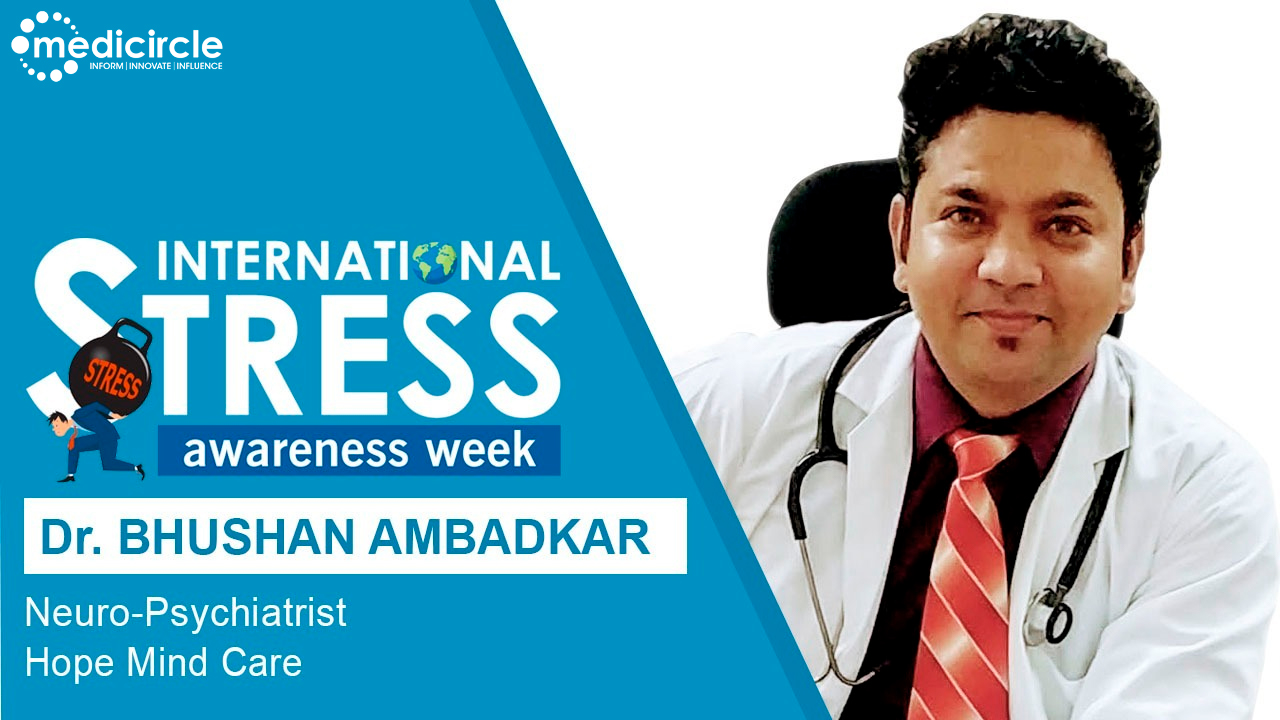The feeling of being overwhelmed or unable to cope with mental and emotional pressure is stress. Stress is our body’s response to pressure. Many different situations or life events can cause stress. Sometimes, this stress response can be useful: it can help us push through fear or pain. However, too much stress can cause negative effects. Long term, this can affect our physical and mental health.
As per the result of a large-scale survey conducted across India in 2019, young adults between the age of 20 and 29 years of both genders were the most stressed in the country. The major cause of high-level stress among young people are peer pressure, pressure to succeed in academics or work, and irregular routines. 50% of Indian professionals have reported that an uncertain future is their topmost source of stress as was revealed in a recently concluded survey by The7thFold, a boutique HR and Wellbeing firm.
Every year, the world celebrates International Stress Awareness Week from 1st to 5th November. The day encourages people to sit back, unwind and embrace peace. Awareness about this become even more significant this year due to the tough times people across the world have gone through in the COVID-19 outbreak. We at Medicircle are conducting the International Stress Awareness Week Series wherein we will be featuring experts in this field to understand and create more awareness about the effects of stress.
Dr. Bhushan Ambadkar is a Neuro-psychiatrist practicing in Hope Mind Care, Pune. He has vast professional experience as a Consultant Psychiatrist & De-addiction specialist. He is specialized in Neuropsychiatrist, sexologists, Psychiatrists & Addiction Psychiatrists. Dr. Bhushan Ambadkar has completed his M.B.B.S from Government Medical College Akola. While he has completed his M.D ( psychiatry) from the Institute of Human Behaviour and Allied Sciences(IHBAS), Delhi.
What is Stress?
Dr. Ambadkar begins, "Stress is a challenge for the body and the mind. Usually, we are in a state of homeostasis, that is we are in a balanced state. When a problem in the external environment arises, our body finds it difficult to respond. This response is stress."
"Stress can be defined as a relationship between the person and the environment, where the person finds the challenge difficult or taxing to his/her wellbeing. Such situations where the body doesn't have resources to tackle the problem are labeled as stress."
"Stress is based on the transaction between the body and the environment. Based on this transaction, our body defines its immunity system and our mind creates its defense mechanism."
How does stress affect our health?
Dr. Ambadkar explains, "When we enter this world, our body is naive when it comes to environmental stress. So when we face any stressful situation, our body will release stress hormones. The release of such hormones will make you anxious or fearful. There is a change in your body because of the release of stress hormones."
"Many disorders are associated with stress. For instance, people think diabetes is only caused by eating a lot of sugar. But there are other factors at play, one of which is stress. There are many physical disorders that are associated with stress. Even mental disorders are caused by stress."
"People who have suffered traumatic events have developed PTSD. Years later, any trembling will cause them to see flashbacks, their BP may shoot up, along with other problems."
Can stress be fatal?
Dr. Ambadkar says, "Definitely. But what we need to also remember is that stress may not always be negative. For instance, if someone gets a promotion even then the person will feel stressed. This stress can help the person perform better at his/her work."
"Some researchers who have tried to understand stress have concluded that stress is related to any gain or loss. Gains like the birth of someone, promotion, or other situations can create stress. Similarly, losing a loved one, financial loss and other losses can cause stress too."
"Then there is positive stress. Every successful person has undergone some stress that has benefited them in achieving their goals and dreams. But on the other hand, long periods of stress can result in anxiety and depression. This is negative stress. Diabetes and hypertension can also be caused."
How to avoid stress?
Dr. Ambadkar mentions, "Stressful events are extraordinary situations. If you have ever experienced any negative situation, you would have noticed that it lingers in your brain longer than any positive situation. So stressful events are going to stay in your mind for a long while."
"What you can change is the perspective with which you see the situation. The first thing to note is whether the event was a one-time thing or it can occur again. If the event has less chance of happening again then our brain can come to terms with it."
"Then the second approach is the way in which the situation can be tackled. Many times people keep making the same choices which result in the same results, creating a vicious cycle. We recommend using a different approach to tackle their stressful event."
"One of them is a distraction tactic. Another is the relaxation technique, which uses yoga and meditation to derive its results. Then there are muscle relaxation techniques for which one needs to visit a physiotherapist."
"A player regularly goes through a great amount of stress. But they have the advantage of perspective which grants them to use the stress positively. We too must change our perspective and convert our stress into something more positive and helpful."
(Edited by Priyal Shah)

 Stress is unavoidable. But what can be changed is our approach to dealing with stress. Learn how a shift in perspective can help turn negative stress into positive stress.
Stress is unavoidable. But what can be changed is our approach to dealing with stress. Learn how a shift in perspective can help turn negative stress into positive stress. 




.jpeg)
.jpeg)
.jpeg)
.jpeg)

.jpeg)
_(1)_(1)_(1).jpeg)

.jpeg)






.jpeg)

.jpeg)

.jpeg)
.jpeg)
.jpeg)
_(1).jpeg)




